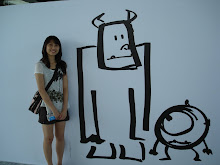When reading Bauerlein’s argument about “knowledge deficits”, I was attracted because of the situation and the fact described in the arguments. I do not like reading, either. I admire people who can sit quietly but imagine vividly. Contrasting to reading, I like visual images and sounds. But “knowledge deficits” indeed happens even with plenty of time in studying and reading. For me, I agree the point with rote memorization in education. My knowledge about history and geography is so limited because I just threw them away after painfully memorizing all the facts for exams. Is studying the same as learning? Sometimes I doubt it. When I study and read, I will try to find the parts which will be questioned in exams. This way helps me to catch important ideas and points quickly. However, important to whom? Why should I think it is important? Should I know that knowledge? No. Because I do not think what I learned in books related to my life. Something like dates of history events and geographic characteristics of other places will not influence my daily life. When I hang out with friends, these kinds of topics will never occur. But also Yes. This kind of common knowledge is shared by everyone. Through history events, what lessons can I learn to avoid mistakes?
The white paper by Ito et al. shows positive aspect of learning through different media and popular culture. And indeed, people learn from different ways and learning indeed happens. However, the concern is still there. Knowledge about what is true knowledge? What should people know? What should teachers teach in class? Is there a balance? I don’t know.
But I think personal meaningfulness is a key in true knowledge hunting. When we have the need, we try to learn in order to gain knowledge to solve problems. The knowledge of history and geography in textbooks is not such meaningful to me. However, after going abroad and meeting people from all over the world, I regret I forgot what I learned in class, but I start learning geography in a more meaningful way. I know different countries and cultures by watching Discovery, talking to friends, and searching information online. In addition, many people gain knowledge by ways except reading books. My brother knows Greek myth better than me even I took an English literature class. He knows characteristics of each role in Greek myth, abilities of Gods, and black arts of evils by playing the game “God of War” with his PlayStation 2. Moreover, knowledge about world geography and history gained by playing games is important for him to win games. People hunts knowledge in different ways, but with personal meaningfulness, knowledge seems truly be gained.

Fabulous point, Ying-Sin. It doesn't even occur to Bauerlein that we (don't ask me to define "we") are CONSCIOUSLY refusing to learn information that he deems as valuable. This, of course, isn't always the case . . . sometimes we don't engage in information because we are ignorant of it. But I think (unfortunately or fortunately or WHATEVER) that it doesn't BOTHER me that I don't know all the capitals of every country, because there are 3000 things higher on my priority list than spending time learning this. It seems to me that Bauerlein equates personal meaningfulness as a stupid, ego-centric, immature way of prioritizing how we should spend our time. Me? I think it's pretty durn smart.
回覆刪除Hunting for knowledge - that's where I'll be.
回覆刪除